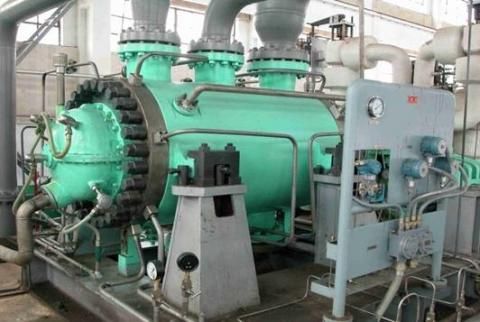How to save centrifugal machinery during commissioning
Below are excerpts from a paper titled, ‘Save your centrifugal machinery during commissioning’ presented at the 43rd Turbomachinery & 30th Pump Users Symposia (Pump & Turbo 2014) in Houston, TX from September 23 to 25, 2014. It was presented by Arun Kumar, Deputy General Manager, Maintenance & Reliability, and Mohit Sabharwal, Assistant General Manager, Maintenance & Reliability, HPCL- Mittal Energy Ltd., India.

In the course of a project, the commissioning and startup of centrifugal machines is considered to be the most critical and stressful phase due to the following reasons:
- Startup is the last and very critical event of very long process from conceptualization to capitalization of project investment and can have severe economic impact on the project. For a 9MMTPA refinery, the average estimated production loss per day is approximately 1.7 million USD. Any delay or deviation from plan causes a huge monetary impact.
- Any delay in upstream phases is expected to be compensated by quick and smooth startup of machines. This creates pressure for an early start-up on rotating equipment commissioning engineers.
- Due to involvement of multiple disciplines and extreme pressure for project completion, the probability of mistakes and miscommunications are present.
- As a standard practice two years maintenance spares or commissioning spares and insurance/capital spares are ordered along with machines. Sometimes, these spares are not sufficient to handle any type of major damage caused due to mishandling of machines and mistakes during commissioning. This can result in startup delay of Units.
Despite of all these potential issues, a safe and smooth start up can be accomplished by following certain procedures, protocols, best practices and maintaining proper communications. This tutorial addresses various probable risks and their mitigation plan at different stages from receipt of equipment at site to successful commissioning and startup of centrifugal machines and details the experiences the authors faced during commissioning of refineries. Various mistakes generally made during different commissioning stages and best practices followed to preserve machinery from any disaster are covered.
What can go wrong?
- Interchange of items of centrifugal machinery package from same vendor causing limitations on start up.
- Damage to turbine internals due to improper steam flushing of steam connected to steam turbines.
- Damage to compressor internals (complete diaphragms, lab seals, rotor)
- Unbalance of rotor assembly caused by entry of external material into suction of machine from piping.
- High vibrations
- Internal rubs & seizures
- Vibrations/ equipment damage due to stresses in connected piping.
- Damage of antifriction bearings in pump due to dust entry in pump bearing housing, in period between erection and startup.
- Vibrations in Hot pumps, seizure.
- High vibrations of driver motors due to soft foot.
- Damage of Hydrodynamic journal bearings and thrust pads & shaft journals bearing due to improper lubrication
- Seal failure in pumps leading to fire.
Lessons learned from experience
- When Dry gas seals are shipped loose, the box should be taken out from common package of compressor and preserved in an air-conditioned room in the warehouse.
- On receipt of material, all the equipment boxes should be marked with Equipment tag, Serial No. and Unit of installation to avoid any misplacement between same makes and models.
- Based on failures, it is recommended to check the auxiliary systems thoroughly as per P&ID diagram before commissioning the machine.
- Proper and complete steam blowing procedure should be followed in steam piping of steam turbines.
- Proper preservation of equipment as per procedure & inspection of bearings before start up.
- Generally while flushing of all piping of compressor, the anti-surge valve is not removed. As a result dirt from connected piping during flushing collects in the valve and clogs it. It is highly recommended that before the flushing and cleaning of pipe line of compressor, its anti-surge valve should be removed and a spool piece be fitted in its place. The anti-surge valve should be reinstalled after the piping flushing.
- Proper flushing with thermal shocking is required before commissioning of centrifugal machinery with hydrodynamic bearings.
- It’s very important learning to properly clean and inspect suction piping, specifically pipe after the suction strainer up to compressor suction nozzle, with effective methods like rotary head device cleaning (Rotomal Cleaning). It is important to carry out boroscopic inspection of suction piping and inside nozzle of compressor to confirm that no foreign particle exist. Only after this should the suction flanges should be tightened.
- The rotary commissioning engineers executed the best practice flushing of compressor and pumps suction line & also carried 100 percent boroscopic inspection of suction piping and suction nozzle of machines, specifically multistage pumps & centrifugal compressors. This proactive approach saved this compressor from major breakdown which could have happened if compressor had started without the removal of foreign material from compressor.
(Arun Kumar is currently working with HPCL- Mittal Energy Ltd., India as head of Maintenance & Reliability and is responsible for Maintenance & Reliability of a 9 MMTPA high complexity Refinery complex at Bathinda, India. Mohit Sabharwal is AGM, Maintenance & Planning in the Maintenance & Reliability team for HPCL - Mittal Energy Limited, Bathinda, India.)